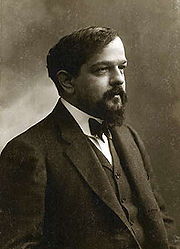Claude Debussy
Chair, Impressionist Studies

- Title Chair, Impressionist Studies
- Office 609 Commonwealth Avenue
- Email debussy@bu.edu
- Phone 617-353-9300
French composer. Along with Maurice Ravel, he is considered one of the most prominent figures working within the field of Impressionist music, though he himself intensely disliked the term when applied to his compositions. Debussy is not only among the most important of all French composers; he was also a central figure in European music at the turn of the twentieth century.
His music is noted for its sensory component and how it is not often formed around one key or pitch. Often Debussy’s work reflected the activities or turbulence in his own life. His music virtually defines the transition from late-Romantic music to twentieth century modernist music. In French literary circles, the style of this period was known as Symbolism, a movement that directly inspired Debussy both as a composer and as an active cultural participant.
Claude Debussy was born in Saint-Germain-en-Laye in 1862, the eldest of five children. His father Manuel-Achille Debussy owned a china shop and was a salesman and his mother Victorine Manoury Debussy was a seamstress. Debussy began piano lessons when he was four years old with an elderly Italian named Cerutti; his lessons were paid for by his aunt. In 1871, the young Debussy gained the attention of Marie Mauté de Fleurville, who claimed to have been a pupil of Frédéric Chopin, and Debussy always believed her, although there is no independent evidence that she was. His talents soon became evident, and in 1872, at age ten, Debussy entered the Paris Conservatoire, where he spent eleven years. During his time there he studied composition with Ernest Guiraud, music history/theory with Louis-Albert Bourgault-Ducoudray, harmony with Émile Durand, piano with Antoine-François Marmontel, organ with César Franck, and solfège with Albert Lavignac, as well as other significant figures of the era.